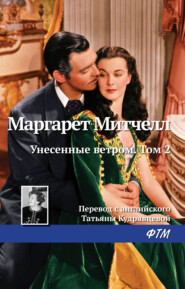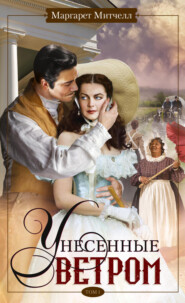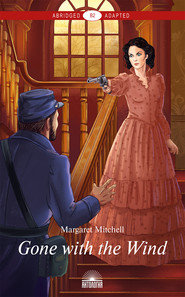По всем вопросам обращайтесь на: info@litportal.ru
(©) 2003-2024.
✖
Gone with the Wind. Volume 2 / Унесенные ветром. Том 2
Настройки чтения
Размер шрифта
Высота строк
Поля
When, at last, they stood together to be married, her confiding little hand in his and her downcast lashes throwing thick black crescents on her pink cheeks, he still did not know how it all came about. He only knew he had done something romantic and exciting for the first time in his life. He, Frank Kennedy, had swept this lovely creature off her feet and into his strong arms. That was a heady feeling.
No friend or relative stood up with them at their marriage. The witnesses were strangers called in from the street. Scarlett had insisted on that and he had given in, though reluctantly, for he would have liked his sister and his brother-in-law from Jonesboro to be with him. And a reception with toasts drunk to the bride in Miss Pitty's parlor amid happy friends would have been a joy to him. But Scarlett would not hear of even Miss Pitty being present.
“Just us two, Frank,” she begged, squeezing his arm. “Like an elopement. I always did want to run away and be married! Please, sweetheart, just for me!”
It was that endearing term, still so new to his ears, and the bright teardrops which edged her pale green eyes as she looked up pleadingly at him that won him over. After all, a man had to make some concessions to his bride, especially about the wedding, for women set such a store by sentimental things.
And before he knew it, he was married.
* * *
Frank gave her the three hundred dollars, bewildered by her sweet urgency, reluctant at first, because it meant the end of his hope of buying the sawmill immediately. But he could not see her family evicted, and his disappointment soon faded at the sight of her radiant happiness, disappeared entirely at the loving way she “took on” over his generosity. Frank had never before had a woman “take on” over him and he came to feel that the money had been well spent, after all.
Scarlett dispatched Mammy to Tara immediately for the triple purpose of giving Will the money, announcing her marriage and bringing Wade to Atlanta. In two days she had a brief note from Will which she carried about with her and read and reread with mounting joy. Will wrote that the taxes had been paid and Jonas Wilkerson “acted up pretty bad” at the news but had made no other threats so far. Will closed by wishing her happiness, a laconic formal statement which he qualified in no way. She knew Will understood what she had done and why she had done it and neither blamed nor praised. But what must Ashley think? she wondered feverishly. What must he think of me now, after what I said to him so short a while ago in the orchard at Tara?
She also had a letter from Suellen, poorly spelled, violent, abusive, tear splotched, a letter so full of venom and truthful observations upon her character that she was never to forget it nor forgive the writer. But even Suellen's words could not dim her happiness that Tara was safe, at least from immediate danger.
It was hard to realize that Atlanta and not Tara was her permanent home now. In her desperation to obtain the tax money, no thought save Tara and the fate which threatened it had any place in her mind. Even at the moment of marriage, she had not given a thought to the fact that the price she was paying for the safety of home was permanent exile from it. Now that the deed was done, she realized this with a wave of homesickness hard to dispel. But there it was. She had made her bargain and she intended to stand by it. And she was so grateful to Frank for saving Tara she felt a warm affection for him and an equally warm determination that he should never regret marrying her.
The ladies of Atlanta knew their neighbors' business only slightly less completely than they knew their own and were far more interested in it. They all knew that for years Frank Kennedy had had an “understanding” with Suellen O'Hara. In fact, he had said, sheepishly, that he expected to get married in the spring. So the tumult of gossip, surmise and deep suspicion which followed the announcement of his quiet wedding to Scarlett was not surprising. Mrs. Merriwether, who never let her curiosity go long unsatisfied if she could help it, asked him point-blank just what he meant by marrying one sister when he was betrothed to the other. She reported to Mrs. Elsing that all the answer she got for her pains was a silly look. Not even Mrs. Merriwether, doughty soul that she was, dared to approach Scarlett on the subject. Scarlett seemed demure and sweet enough these days, but there was a pleased complacency in her eyes which annoyed people and she carried a chip on her shoulder which no one cared to disturb.
She knew Atlanta was talking but she did not care. After all, there wasn't anything immoral in marrying a man. Tara was safe. Let people talk. She had too many other matters to occupy her mind. The most important was how to make Frank realize, in a tactful manner, that his store should bring in more money. After the fright Jonas Wilkerson had given her, she would never rest easy until she and Frank had some money ahead. And even if no emergency developed, Frank would need to make more money, if she was going to save enough for next year's taxes. Moreover, what Frank had said about the sawmill stuck in her mind. Frank could make lots of money out of a mill. Anybody could, with lumber selling at such outrageous prices. She fretted silently because Frank's money had not been enough to pay the taxes on Tara and buy the mill as well. And she made up her mind that he had to make more money on the store somehow, and do it quickly, so he could buy that mill before some one else snapped it up. She could see it was a bargain.
If she were a man she would have that mill, if she had to mortgage the store to raise the money. But, when she intimated this delicately to Frank, the day after they married, he smiled and told her not to bother her sweet pretty little head about business matters. It had come as a surprise to him that she even knew what a mortgage was and, at first, he was amused. But this amusement quickly passed and a sense of shock took its place in the early days of their marriage. Once, incautiously, he had told her that “people” (he was careful not to mention names) owed him money but could not pay just now and he was, of course, unwilling to press old friends and gentlefolk. Frank regretted ever mentioning it for, thereafter, she had questioned him about it again and again. She had the most charmingly childlike air but she was just curious, she said, to know who owed him and how much they owed. Frank was very evasive about the matter. He coughed nervously and waved his hands and repeated his annoying remark about her sweet pretty little head.
It had begun to dawn on him that this same sweet pretty little head was a “good head for figures.” In fact, a much better one than his own and the knowledge was disquieting. He was thunderstruck to discover that she could swiftly add a long column of figures in her head when he needed a pencil and paper for more than three figures. And fractions presented no difficulties to her at all. He felt there was something unbecoming about a woman understanding fractions and business matters and he believed that, should a woman be so unfortunate as to have such unladylike comprehension, she should pretend not to. Now he disliked talking business with her as much as he had enjoyed it before they were married. Then he had thought it all beyond her mental grasp and it had been pleasant to explain things to her. Now he saw that she understood entirely too well and he felt the usual masculine indignation at the duplicity of women. Added to it was the usual masculine disillusionment in discovering that a woman has a brain.
Just how early in his married life Frank learned of the deception Scarlett had used in marrying him, no one ever knew. Perhaps the truth dawned on him when Tony Fontaine, obviously fancy free, came to Atlanta on business. Perhaps it was told him more directly in letters from his sister in Jonesboro who was astounded at his marriage. Certainly he never learned from Suellen herself. She never wrote him and naturally he could not write her and explain. What good would explanations do anyway, now that he was married? He writhed inwardly at the thought that Suellen would never know the truth and would always think he had senselessly jilted her. Probably everyone else was thinking this too and criticizing him. It certainly put him in an awkward position. And he had no way of clearing himself, for a man couldn't go about saying he had lost his head about a woman-and a gentleman couldn't advertise the fact that his wife had entrapped him with a lie.
Scarlett was his wife and a wife was entitled to the loyalty of her husband. Furthermore, he could not bring himself to believe she had married him coldly and with no affection for him at all. His masculine vanity would not permit such a thought to stay long in his mind. It was more pleasant to think she had fallen so suddenly in love with him she had been willing to lie to get him. But it was all very puzzling. He knew he was no great catch for a woman half his age and pretty and smart to boot, but Frank was a gentleman and he kept his bewilderment to himself. Scarlett was his wife and he could not insult her by asking awkward questions which, after all, would not remedy matters.
Not that Frank especially wanted to remedy matters, for it appeared that his marriage would be a happy one. Scarlett was the most charming and exciting of women and he thought her perfect in all things-except that she was so headstrong. Frank learned early in his marriage that so long as she had her own way, life could be very pleasant, but when she was opposed- Given her own way, she was as gay as a child, laughed a good deal, made foolish little jokes, sat on his knee and tweaked his beard until he vowed he felt twenty years younger. She could be unexpectedly sweet and thoughtful, having his slippers toasting at the fire when he came home at night, fussing affectionately about his wet feet and interminable head colds, remembering that he always liked the gizzard of the chicken and three spoonfuls of sugar in his coffee. Yes, life was very sweet and cozy with Scarlett-as long as she had her own way.
* * *
When the marriage was two weeks old, Frank contracted the grippe and Dr. Meade put him to bed. In the first year of the war, Frank had spent two months in the hospital with pneumonia and he had lived in dread of another attack since that time, so he was only too glad to lie sweating under three blankets and drink the hot concoctions Mammy and Aunt Pitty brought him every hour.
The illness dragged on and Frank worried more and more about the store as each day passed. The place was in charge of the counter boy, who came to the house every night to report on the day's transactions, but Frank was not satisfied. He fretted until Scarlett who had only been waiting for such an opportunity laid a cool hand on his forehead and said: “Now, sweetheart, I shall be vexed if you take on so. I'll go to town and see how things are.”
And she went, smiling as she smothered his feeble protests. During the three weeks of her new marriage, she had been in a fever to see his account books and find out just how money matters stood. What luck that he was bedridden!
The store stood near Five Points, its new roof glaring against the smoked bricks of the old walls. Wooden awnings covered the sidewalk to the edge of the street, and at the long iron bars connecting the uprights horses and mules were hitched, their heads bowed against the cold misty rain, their backs covered with torn blankets and quilts. The inside of the store was almost like Bullard's store in Jonesboro, except that there were no loungers about the roaring red-hot stove, whittling and spitting streams of tobacco juice at the sand boxes. It was bigger than Bullard's store and much darker. The wooden awnings cut off most of the winter daylight and the interior was dim and dingy, only a trickle of light coming in through the small fly-specked windows high up on the side walls. The floor was covered with muddy sawdust and everywhere was dust and dirt. There was a semblance of order in the front of the store, where tall shelves rose into the gloom stacked with bright bolts of cloth, china, cooking utensils and notions. But in the back, behind the partition, chaos reigned.
Here there was no flooring and the assorted jumble of stock was piled helter-skelter on the hard-packed earth. In the semi-darkness she saw boxes and bales of goods, plows and harness and saddles and cheap pine coffins. Secondhand furniture, ranging from cheap gum to mahogany and rosewood, reared up in the gloom, and the rich but worn brocade and horsehair upholstery gleamed incongruously in the dingy surroundings. China chambers and bowl and pitcher sets littered the floor and all around the four walls were deep bins, so dark she had to hold the lamp directly over them to discover they contained seeds, nails, bolts and carpenters' tools.
“I'd think a man as fussy and old maidish as Frank would keep things tidier,” she thought, scrubbing her grimy hands with her handkerchief. “This place is a pig pen. What a way to run a store! If he'd only dust up this stuff and put it out in front where folks could see it, he could sell things much quicker.”
And if his stock was in such condition, what mustn't his accounts be!
I'll look at his account book now, she thought and, picking up the lamp, she went into the front of the store. Willie, the counter boy, was reluctant to give her the large dirty-backed ledger. It was obvious that, young as he was, he shared Frank's opinion that women had no place in business. But Scarlett silenced him with a sharp word and sent him out to get his dinner. She felt better when he was gone, for his disapproval annoyed her, and she settled herself in a split-bottomed chair by the roaring stove, tucked one foot under her and spread the book across her lap. It was dinner time and the streets were deserted. No customers called and she had the store to herself.
She turned the pages slowly, narrowly scanning the rows of names and figures written in Frank's cramped copperplate hand. It was just as she had expected, and she frowned as she saw this newest evidence of Frank's lack of business sense. At least five hundred dollars in debts, some of them months old, were set down against the names of people she knew well, the Merriwethers and the Elsings among other familiar names. From Frank's deprecatory remarks about the money “people” owed him, she had imagined the sums to be small. But this!
“If they can't pay, why do they keep on buying?” she thought irritably. “And if he knows they can't pay, why does he keep on selling them stuff? Lots of them could pay if he'd just make them do it. The Elsings certainly could if they could give Fanny a new satin dress and an expensive wedding. Frank's just too soft hearted, and people take advantage of him. Why, if he'd collected half this money, he could have bought the sawmill and easily spared me the tax money, too.”
Then she thought: “Just imagine Frank trying to operate a sawmill! God's nightgown! If he runs this store like a charitable institution, how could he expect to make money on a mill? The sheriff would have it in a month. Why, I could run this store better than he does! And I could run a mill better than he could, even if I don't know anything about the lumber business!”
A startling thought this, that a woman could handle business matters as well as or better than a man, a revolutionary thought to Scarlett who had been reared in the tradition that men were omniscient and women none too bright. Of course, she had discovered that this was not altogether true but the pleasant fiction still stuck in her mind. Never before had she put this remarkable idea into words. She sat quite still, with the heavy book across her lap, her mouth a little open with surprise, thinking that during the lean months at Tara she had done a man's work and done it well. She had been brought up to believe that a woman alone could accomplish nothing, yet she had managed the plantation without men to help her until Will came. Why, why, her mind stuttered, I believe women could manage everything in the world without men's help-except having babies, and God knows, no woman in her right mind would have babies if she could help it.
With the idea that she was as capable as a man came a sudden rush of pride and a violent longing to prove it, to make money for herself as men made money. Money which would be her own, which she would neither have to ask for nor account for to any man.
“I wish I had money enough to buy that mill myself,” she said aloud and sighed. “I'd sure make it hum. And I wouldn't let even one splinter go out on credit.”
She sighed again. There was nowhere she could get any money, so the idea was out of the question. Frank would simply have to collect this money owing him and buy the mill. It was a sure way to make money, and when he got the mill, she would certainly find some way to make him be more businesslike in its operation than he had been with the store.
She pulled a back page out of the ledger and began copying the list of debtors who had made no payments in several months. She'd take the matter up with Frank just as soon as she reached home. She'd make him realize that these people had to pay their bills even if they were old friends, even if it did embarrass him to press them for money. That would probably upset Frank, for he was timid and fond of the approbation of his friends. He was so thin skinned he'd rather lose the money than be businesslike about collecting it.
And he'd probably tell her that no one had any money with which to pay him. Well, perhaps that was true. Poverty was certainly no news to her. But nearly everybody had saved some silver or jewelry or was hanging on to a little real estate. Frank could take them in lieu of cash.
She could imagine how Frank would moan when she broached such an idea to him. Take the jewelry and property of his friends! Well, she shrugged, he can moan all he likes. I'm going to tell him that he may be willing to stay poor for friendship's sake but I'm not. Frank will never get anywhere if he doesn't get up some gumption. And he's got to get somewhere! He's got to make money, even if I've got to wear the pants in the family to make him do.
She was writing busily, her face screwed up with the effort, her tongue clamped between her teeth, when the front door opened and a great draft of cold wind swept the store. A tall man came into the dingy room walking with a light Indian-like tread, and looking up she saw Rhett Butler.
He was resplendent in new clothes and a greatcoat with a dashing cape thrown back from his heavy shoulders. His tall hat was off in a deep bow when her eyes met his and his hand went to the bosom of a spotless pleated shirt. His white teeth gleamed startlingly against his brown face and his bold eyes raked her.
“My dear Mrs. Kennedy,” he said, walking toward her. “My very dear Mrs. Kennedy!” and he broke into a loud merry laugh.
At first she was as startled as if a ghost had invaded the store and then, hastily removing her foot from beneath her, she stiffened her spine and gave him a cold stare.
“What are you doing here?”
“I called on Miss Pittypat and learned of your marriage and so I hastened here to congratulate you.”
The memory of her humiliation at his hands made her go crimson with shame.
“I don't see how you have the gall to face me!” she cried.
“On the contrary! How have you the gall to face me?”
“Oh, you are the most-”
“Shall we let the bugles sing truce?” he smiled down at her, a wide flashing smile that had impudence in it but no shame for his own actions or condemnation for hers. In spite of herself, she had to smile too, but it was a wry, uncomfortable smile.
“What a pity they didn't hang you!”
“Others share your feeling, I fear. Come, Scarlett, relax. You look like you'd swallowed a ramrod and it isn't becoming. Surely, you've had time to recover from my-er-my little joke.”
“Joke? Ha! I'll never get over it!”

















